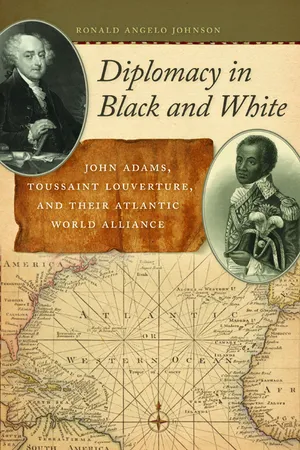
Diplomacy in Black and White
John Adams, Toussaint Louverture, and Their Atlantic World Alliance
- 264 pages
- English
- ePUB (mobile friendly)
- Available on iOS & Android
Diplomacy in Black and White
John Adams, Toussaint Louverture, and Their Atlantic World Alliance
About This Book
From 1798 to 1801, during the Haitian Revolution, President John Adams and Toussaint Louverture forged diplomatic relations that empowered white Americans to embrace freedom and independence for people of color in Saint-Domingue. The United States supported the Dominguan revolutionaries with economic assistance and arms and munitions; the conflict was also the U.S. Navy's first military action on behalf of a foreign ally. This cross-cultural cooperation was of immense and strategic importance as it helped to bring forth a new nation: Haiti.
Diplomacy in Black and White is the first book on the Adams-Louverture alliance. Historian and former diplomat Ronald Angelo Johnson details the aspirations of the Americans and Dominguans—two revolutionary peoples—and how they played significant roles in a hostile Atlantic world. Remarkably, leaders of both governments established multiracial relationships amid environments dominated by slavery and racial hierarchy. And though U.S.-Dominguan diplomacy did not end slavery in the United States, it altered Atlantic world discussions of slavery and race well into the twentieth century.
Diplomacy in Black and White reflects the capacity of leaders from disparate backgrounds to negotiate political and societal constraints to make lives better for the groups they represent. Adams and Louverture brought their peoples to the threshold of a lasting transracial relationship. And their shared history reveals the impact of decisions made by powerful people at pivotal moments. But in the end, a permanent alliance failed to emerge, and instead, the two republics born of revolution took divergent paths.
Frequently asked questions
Information
NOTES
| Abbreviations | |
| AA | Abigail Adams |
| Adams Works | John Adams, The Works of John Adams, ed. Charles Francis |
| | Adams, 10 vols. (Boston: Little, Brown, 1851–65) |
| AH | Alexander Hamilton |
| AHR | J. Franklin Jameson, ed., “Letters of Toussaint Louverture and of Edward Stevens, 1798–1800,” American Historical Review 16 (1910): 64–101 |
| BS | Benjamin Stoddert |
| CT | Charles Talleyrand |
| DCH | Despatches from U.S. Consuls in Cap-Haïtien, Haiti, 1791–1906, National Archives, College Park, Md. |
| ES | Edward Stevens |
| Hamilton Papers | Alexander Hamilton, The Papers of Alexander Hamilton, ed. |
| | Harold Syrett, 27 vols. (New York: Columbia University Press, 1961–87) |
| HMC | Haiti Miscellaneous Collection, Schomburg Center for Research in Black Culture, New York Public Library, New York |
| Debates | Debates and Proceedings of the Congress of the United States |
| | (Washington, D.C.: Gales and Seaton, 1851) |
| HSP | Historical Society of Pennsylvania, Philadelphia |
| JA | John Adams |
| JM | James Madison |
| LCRK | Rufus King, The Life and Correspondence of Rufus King, ed. |
| | Charles R. King, 6 vols. (New York: Putnam’s, 1894–1900) |
| Madison Papers | James Madison, The Papers of James Madison: Secretary of State Series, ed. Robert Brugger, 9 vols. (Charlottesville: University Press of Virginia, 1986–2011) |
| MAE Records | Records of the Ministère des Affaires Étrangères, France, Library of Congress, Washington, D.C. |
| Memoirs | George Gibbs, ed., Memoirs of the Administrations of Washington and John Adams, 2 vols. (New York: Van Norden, 1846) |
| Naval Documents | U.S. Department of the Navy, Naval Documents Related to the Quasi-War between the United States and France, 7 vols. (Washington, D.C.: U.S. Government Printing Office, 1934–37) |
| OW | Oliver Wolcott |
| Pickering Papers | Timothy Pickering Papers, Humanities, Social Science, and Education Library, Purdue University, West Lafayette, Ind. |
| PL | Philippe Letombe |
| RK | Rufus King |
| ST | Silas Talbot |
| TJ | Thomas Jefferson |
| TL | Toussaint Louverture |
| TP | Timothy Pickering |
INTRODUCTION. The Atlantic World
Table of contents
- Cover Page
- Title Page
- Copyright Page
- dedication
- Contents
- List of Illustrations
- Acknowledgments
- Introduction
- One Saint-Dominguan Revolution: “We Can and Must Do Something There”
- Two U.S. Involvement: “Even South Carolinians Voted for It”
- Three Edward Stevens: “Our Minister to Toussaint”
- Four Dominguan-American Diplomacy: “So Natural”
- Five Allied Command: “Willing to Serve General Toussaint”
- Six The United States and Hispaniola: “On a Permanent and Advantageous Footing”
- Seven After Adams and Louverture: “Great Changes Likely to Take Place”
- Notes
- Bibliography
- Index